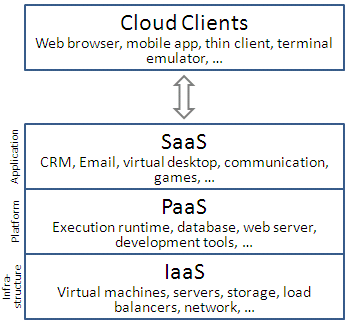
International Data Corporation (IDC) predicts that by 2020, 2/3rd of the organization’s software and infrastructure will be for cloud-based services.
In recent years, access to the internet has become faster and cheaper. Organizations around the world are utilizing the latest IT technology to provide new and advanced services to their clients to grow their businesses. In computing terms, the cloud is referred to as a remote server or a network of remote servers which are used for storing and processing data. In general terms, it can be seen as your personal computer which performs tasks and takes instructions remotely.
Over the years, the cloud has evolved from personal storage to enterprises storing and processing data entirely on the cloud such as Netflix. Anything that you watch on Netflix is processed and accessed remotely from their data centers.
Power of Cloud
Traditional enterprise infrastructure was limited due to on-premise servers and data centers which were not flexible. With cloud computing technology, you are free to sign up for any server or any operating system and only pay for resources that your business requires. With a cloud server, you also save a lot of time for maintenance and space required for large networking equipment. Also, cloud services can dynamically scale to meet its user’s requirements.
What does Cloud offer?
Internet commerce companies like Amazon, a leader among cloud services, provide software and hardware solution to other businesses. They help businesses to increase their IT activities without having to add new infrastructure. With the cloud, you can have following services that suit your business requirements.

Source: https://en.wikipedia.org/wiki/File:Cloud_computing_layers.png
-
Infrastructure as a Service (IaaS):
It is the lowest level of cloud service which offers maximum control. The key term behind IaaS is Virtualization. Cloud service provider runs a virtual machine for each IaaS client. You have the freedom to select servers, load balancers, firewalls, and other networking equipment. Moreover, with IaaS, you can select a CPU, memory, and storage that is suitable for your business. Also, you can easily scale up the configuration whenever needed.
-
Platform as a Service (PaaS):
PaaS providers deliver a computing platform which is typically consumed by application developers. It includes an operating system, database and web server, programming language and more related to development. With PaaS, developers can run their applications on a cloud platform especially if the application is designed for complex systems. With this, a developer is free to test and utilize all the resources without worrying about the damage to the underlying hardware/software layers.
-
Software as a Service (SaaS):
SaaS providers install your software application on cloud and makes them available to your customers on demand. With SaaS, your organization doesn’t have to manage the infrastructure and platform on which your software runs. A common example of SaaS which you might have used more often is an online email service like Gmail. As a user, you don’t need to download the copy of the software on your system. Instead, you generally access it using the Internet and web browser. Because of its global accessibility and simplified use, SaaS is becoming more popular among startups.
Why companies are migrating their services to CLOUD?
Cloud computing provides many advantages as compared to the traditional set-ups. Below are the factors which will compel you to use at least one cloud service for your organization.
- Flexibility over the resources needed for your organization. From entire infrastructure for creating platforms to providing software services to daily users, the cloud offers more flexibility.
- Global accessibility using the Internet.
- Access to high-end and complex IT equipment which otherwise would have been very costly.
- Freedom from managing resources so that you can focus on your core business operations.
- Cost efficient because you mostly pay for the service you require rather than the hardware.
- Easy testing and deployment of the application for your developers.
- No manual updates required because they are automatically managed by the cloud service provider.
- Built-in security and reliability of your sensitive data. Cloud service providers have multiple data centers to back up your data and deliver a robust service.
Conclusion
“I don’t need a hard disk in my computer if I can get to the server faster. Carrying around these non-connected computers is byzantine by comparison”
-Steve Jobs
Every time you access your email, post a photo on Instagram or watch a video on YouTube, you make use of cloud computing. Cloud Computing empowers developers and companies to innovate. Its services are more flexible and globally accessible. You can plan to integrate at least one cloud service in your organization. Availability of high-capacity equipment and low-cost storage devices makes cloud suitable for every enterprise. With the cloud, your IT team will develop rapidly and adjust to fluctuating requirements easily.
Contact Bleuwire™ to learn more about cloud services and solutions – how they can help your business.





